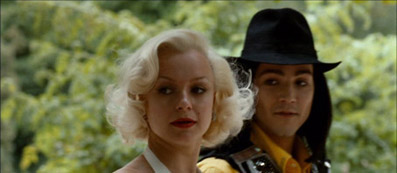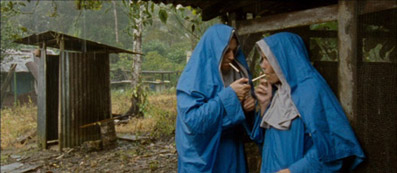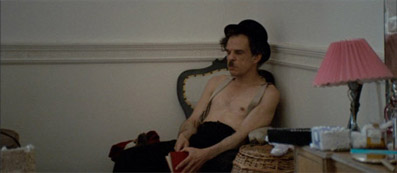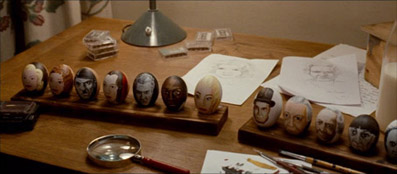| |
"All I want is to be better than myself, to become less ordinary and find some purpose in this world." |
| |
Michael |
If you're new to the world of Harmony Korine, Mister Lonely is going to come as something of a shock. You may be relieved to learn that it's definitely not the kind of shock provided by Lars Von Trier's Antichrist but, it will test you in other ways, and isn't the easiest of films to watch as a result. Korine's film is more a shock to the system; the kind of system which admires or merely enjoys structure and logic in films. If you're the kind of person that's confused or irritated by non-linear or fragmentary narrative structures, then this is not the film for you. If, however, you're the kind of film lover that goes in for the strange, embraces the odd; then you're in for a treat, and Mister Lonely, might just be your new cinematic best friend.
Like all good 'off the beaten path' films, Mister Lonely has a backstory worthy of chronicling in its own right. Much like the iconic figures portrayed in the film, Korine was battling with demons, and the success he attained with as a writer on Larry Clarke's Kids and as a writer-director with Gummo and Julien-Donkey Boy (the only non-European film made to the regulations of the Dogme '95 manifesto) came at a price. Originally conceived after the latter's release, it hit the first snag in the form of ever-elusive funding, and the second stumbling block came in the form of Korine himself as he struggled with addiction and creative burn-out. Disillusioned with cinema and feeling disconnected from the world, Korine effectively withdrew from life, intent on destroying himself and what he'd become famous – perhaps even infamous – for. All told, Korine's recovery process meant that it took another eight years the film to make it to screen.

As such, Mister Lonely is part return and part rebirth, since while there are definite indications of Korine's dark humour, and distinctive visual style, it's also equally clear that this is not the Harmony Korine of old. Just as the man has changed, so have his films. Written in partnership with his younger brother Avi, Mister Lonely's plot – if it can be called such a thing – is twofold, with one strand devoted to an unnamed isolated young man living and working in Paris as a Michael Jackson impersonator (the ever impressive Diego Luna), and another to Catholic priest Father Umbrillo (played wonderfully by long-time Korine enthusiast and fellow director Werner Herzog), who's leading a group of nuns in Panama as they carry out an aid mission, dropping in food by plane. At first, the two plots seem disparate and ridiculous, but there's actually a place of convergence in the unlikely form of a miracle, one biblical and one personal.
Michael's fortunes change when gets a booking from his pushy agent Renard (Leos Carax), to perform at a local home for the elderly. Whilst there, he crosses paths with a fellow impersonator as she puts it, is "living as" Marilyn Monroe (an excellent Samantha Morton). The pair strike up a friendship, and she tells him about her life in a community of impersonators somewhere in the Scottish Highlands and invites him to join her. Though Michael is initially unsure, he changes his mind and takes up her offer. Upon his arrival, he's given warm welcome by Marilyn's husband Charlie Chaplin (Denis Lavant), her daughter Shirley Temple (Esme Creed-Miles, Morton's real-life daughter) and the rest of the performers, including the Pope (James Fox) Queen Elizabeth II (Anita Pallenberg), Curly, Larry and Moe Stooge (Nigel Cooper, Mal Whiteley and Daniel Rovai respectively), Abraham Lincoln (Richard Strange) and Little Red Riding Hood (Rachel Korine, the director's wife) and Shirley's young playmate, Buckwheat (Michael Joel-Stuart). Finally feeling accepted, he soon settles into life in the commune, helping to publicise a special outdoor performance, in the hope of attracting visitors and showcasing their talents. Elsewhere, whilst completing their missionary work, the nuns accidentally discover an extraordinary talent, learning that they can fly without the aid of a parachute, and the sisters are soon testing the limits of their newly-acquired gift. The Vatican soon learns of this and proclaim it to be a miracle, granting them an audience with the real Pope.

As is already evident if you've found the description of this film hard to follow, Mister Lonely is packed full with self-reflexive references that sometimes reach mind-boggling levels of complexity. If you're thinking that this is just Korine playing smart and fitting in elements of humour, then, to a degree you're right. There are some elements that are purely present for their comedic value, whether it's nuns sneaking off for a smoke whilst in their habits or a sweet, reassuring nighttime chat between the Pope and the Queen in their shared bed. The Korine brothers' comedy is one which arises from finding pleasure in images that are naturally incongruous and unexpected, playing with established convention, whether that be in the form of the iconography associated with certain social groups and types of dress or the behaviour they exhibit. You can almost feel the schoolboy glee Korine takes in showing these figures at their most ordinary and challenging their revered status.
The director has always revelled in the abstract and the absurd – how many times did you ponder the meaning of the solitary piece of bacon nailed to the wall in Gummo? – and Mister Lonely retains that level of strange beauty, with some particularly haunting images peppered throughout the film via director of photography Marcel Zyskind, which oscillate from leaving you awestruck at their wondrousness (the lush, verdant, aerial shots of Pananma the cool, mist-laden Highlands or the nuns freefall and mid-air acrobatics) strangeness (Buckwheat riding a miniature pony through the woodlands surrounding the commune) or their brutality (when the group are forced to kill their stricken flock of sheep and burn their bodies on a pyre).
In light of events since the making of the film, it's difficult not to think about the star personas of Monroe, Chaplin and the rest of the assembled players without also turning your thoughts towards Michael Jackson himself. On the face of it, our perception of Mr Lonely as a film will undoubtedly be altered by Jackson's passing. If you gain nothing else from Korine's film, it will leave you pondering the many and varied opinions we have on stars, stardom and the relationship between their public and private selves. In a similar manner to the aforementioned comedic sequences, Korine further breaks down stereotypes and received notions about the process of performance and 'becoming' someone else by reminding us of the human being inside. Naturally, Jackson's death means that lends Luna's character an air of the tragic, but it's much in the same manner as everyone else in the commune, their iconic status means they're frozen in the aspic of our culture, just as the impersonators who don their persona as a mask are broken and lost, existing in a different kind of stasis. In the end though, it doesn't really matter who they choose to impersonate, and where this film really excels (as does Luna) is uncovering the person underneath, and it's just as interesting to see Luna's character shed the skin of Jackson's persona to become his own man and find his place in the world as is it to watch him mimic Jackson in the first place.

Whether by accident or design, the fact that Korine doesn't use any of Jackson's vast musical catalogue directly via the soundtrack (opting instead for original music written and performed fifty-fifty by Sun City Girls and Spritualized's Jason 'Spaceman' Pierce), but does reference them every so often at various points in the form of moving superimposed graphics, acting like chapter breaks. In doing so, the film rather neatly eschews the potential for mawkishness and morbidity that watching the film after Jackson's death would typically inspire. That said, there are moments where the shadow of Jackson's departed figure looms large. You can't help but be affected by the sight of Michael, sat alone on a bench as the lyric hook for 'You Are Not Alone' passes above his head like a lifestyle guru's motivational mantra.
However, if you're thinking that Korine's film is simply a meditation upon fame and isolation, then you're mistaken. As trite as it may sound, Mister Lonely is a film about people, and the struggle we have with our own identity, how and where we belong in the world, and how we deal with the times when we fail to achieve what we desire. At first, Luna's character's desire to become 'less ordinary' appears indicative of the compulsion to be famous and adored, but I think it goes deeper than that. For this young man, it's not about achieving celebrity and the immortality that comes with it, but rather, it's about being seen and valued in the most basic sense. In essence, he wants to feel important and doesn't want to be forgotten amongst the other six billion plus inhabitants of Earth.
Though the ending of the film could be considered bleak, and things for Michael and the other commune members never turn out how they envisage the lesson of this film – if you want read it as such – is the power of human interaction and connection. No man, as the adage goes, is an island, and these characters are constantly trying to build bridges and forge links with each other, to interact with, better, and change the world around them.
I've watched Mister Lonely a few times now, and I seem to get something different from it each time. I can't say I completely understand it, but I can say I admire it a great deal, for its sheer originality, inventiveness and tenacity. Risks in cinema are taken all too rarely, but sometimes, they can and do pay off. Though it may have taken Korine some years to regain his passion for cinema, I'm incredibly glad he did. Mister Lonely isn't the easiest of films to explain, but if you embrace it, then it becomes a lot of fun to watch. Of the many questions the film inevitably poses perhaps we be less concerned with the whys and wherefores and be more open to the concept of why not.
Filmed, our siurces suggest, on a mixture of 16mm and 35mm and combined into a Super-16 master, the 2.35:1 anamorphic transfer here does sometimes reflect the 16mm source in some slightly softer wide shots and visible grain, but for the most part the picture looks good, with a respectable level of detail, and well balanced contrast, despite some occasional loss of shadow detail to keep those blacks solid. The colour balance is also pleasing, toned down just a notch but not messed about to much in post-production, and the picture intrigrity holds even in darker scenes, which is always a good sign.

Dolby stereo 2.0 only, but it suits the tone of the film well and is as clear and well mixed as you'd expect from even an independent modern movie. There is some separation on music and effects but is appropriately subtle.
The collapse of Tartan in 2008 saw this release delayed, and although there aren't any extras on this ICA one – which is a shame, given the creative talent behind the film – the feature itself more than makes up for it.
For fans of Korine's work and this project in particular, it's worth seeking out the region 4 release if you can find a copy online. It includes a short making-of documentary and forty minutes of scenes that didn't make the theatrical cut.
On a related note, Korine's set photographer on the film, Brent Stewart has produced The Lonely (premiered at Nashville's Film Festival last April), which follows Korine throughout the production, and is well worth looking out for, and hopefully it will gain a wider release.
Quirky, complex, thought-provoking and unmistakably Harmony Korine, Mister Lonely is very much an acquired taste. You'll either embrace and enjoy the experience or be confused and annoyed by it. There's no room for anything approaching middle ground. However, for those wanting something different and are willing go the distance, Mister Lonely could well provide multiple rewards. A rather unique experience.
|